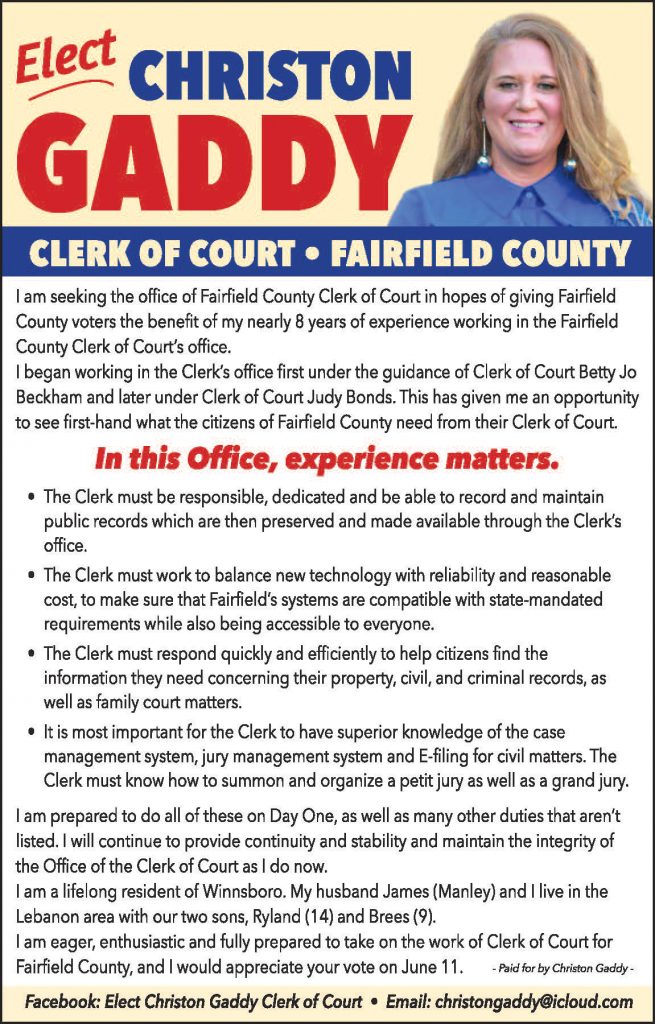JENKINSVILLE – The Jenkinsville Water Company was hit last year with a new drinking water violation, though it and other past violations have been resolved, according to the S.C. Department of Health and Environmental Control.
The latest DHEC violation notice was issued Aug. 24, 2017. It stated that the JWC was in violation of the State Primary Drinking Water Regulation.
Specifically, the water company failed “to collect all triggered source water samples and collecting source water samples during treatment,” according to documents The Voice obtained through the state’s Freedom of Information Act.
The violation occurred during the August 2017 monitoring period, though DHEC said last week that the violation is no longer active.
“DHEC has no current violations on record or pending actions against Jenkinsville Water Company,” DHEC spokesman Tommy Crosby said via email.
Coliform test prompts violation
The DHEC water violation website at https://bit.ly/2LjbJGk lists E. coli as the analyte, or substance, that it tested in August 2017.
DHEC’s violation letter states the JWC was in violation of a regulation that requires public water systems to provide notice of follow-up testing after positive total coliform samples are found.
JWC is required to collect “at least one ground water source sample from each ground water source in use at the time the total coliform-positive sample was collected,” the letter states.
Coliform-positive tests do not necessarily mean E. coli is present. Positive readings simply mean coliforms are present, according to the Environmental Protection Agency.
“Generally coliforms are bacteria that are not harmful and are naturally present in the environment,” the EPA website states. “They are used as an indicator that other, potentially harmful, fecal bacteria (indicated by the E. coli species) could be present.”
The violation letter states the JWC must collect ground water samples before any treatment of the groundwater source. JWC is also required to notify customers of the violation within one year the letter.
The purpose of coliform testing is to determine whether additional testing for E. coli and other harmful bacteria is necessary, the EPA website states.
Some strains of E. coli can sicken humans. Symptoms include diarrhea, urinary tract infections, respiratory illnesses, pneumonia and other conditions, according to the Centers for Disease Control and Prevention.
Although DHEC says the JWC is no longer in violation of water rules, the DHEC website lists two enforcement actions dated Nov. 2, 2017.
One action is labeled “ST Violation/Reminder Notice.” The other states “ST Public Notif [sic] Requested.”
DHEC had not provided copies of the enforcement actions to The Voice as of press time.
Other violations
This isn’t the first time the JWC has been in hot water with DHEC.
In June 2016, DHEC notified the water company that the state agency found several deficiencies during a May 2016 sanitary survey of the Jenkinsville water system.
“The intent of the survey is to evaluate a public water system’s ability to provide a continuous supply of safe drinking water to its customers following the guidelines established by the State Primary Drinking Water Regulations,” the letter states.
The 2016 survey listed 12 items of deficiency, resulting in a “needs improvement” rating from DHEC, though the rating was upgraded to “satisfactory” a month later, documents show.
Among the deficiencies listed in the survey were reports of cracks in Wells 11 and 13 and labeling issues of chlorine vats. Some backflow tests also had not been submitted and were missing.
The Clowney Road tank was “in need of an inspection ASAP and repair,” documents state.
“The paint is peeling and rusting at the bottom of the tank support along with rust and peeling paint on the legs and support rods,” the survey states. “If it is not addressed before the next survey, this item will receive an unsatisfactory.”
Radioactivity case closed
Documents The Voice obtained through FOIA state the water company also faced sanctions from DHEC over radioactivity levels in the public water system.
In 2014, DHEC stated that Jenkinsville water levels exceeded maximum contaminant levels for Radium 226 and Radium 228.
Radium 226 and Radium 228 are isotopes of radium, a naturally occurring radioactive element generally present in low levels in all soil, water and rocks, according to the U.S. Geological Survey.
Federal drinking standards require radioactivity levels below 5 picocuries per liter. However, tests yielded readings ranging between 5.3 and 8.4 pCi/L, DHEC records state.
Alpha particles were also found to be in excess of the federal standard of 15 pCi/L, with readings ranging from 18.1 to 24.7 pCi/L, documents further state.
DHEC ordered the JWC to form a corrective action plan addressing the radioactivity levels. The water company faced a possible $8,000 fine for non-compliance.
In March 2018, DHEC notified JWC that it had met the requirements of the action plan. DHEC also stated that the JWC complied with radioactivity requirements for a 12-month period.
DHEC, though, noted that it would continue monitoring radioactivity levels on a quarterly basis.
“Any future violations of the [maximum contaminant level] for combined radium 226/228 or gross alpha particle activity will result in further enforcement action which may include the assessment of civil penalties,” the March 16 letter states.












